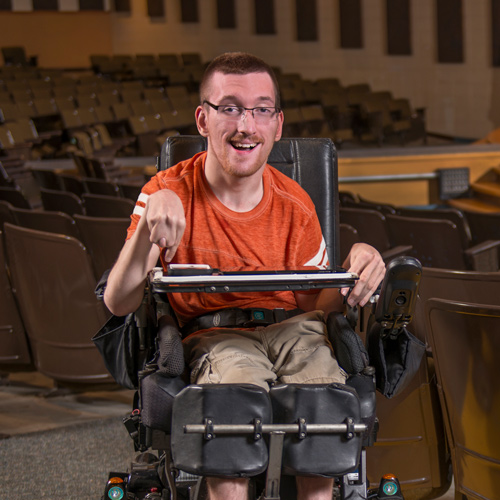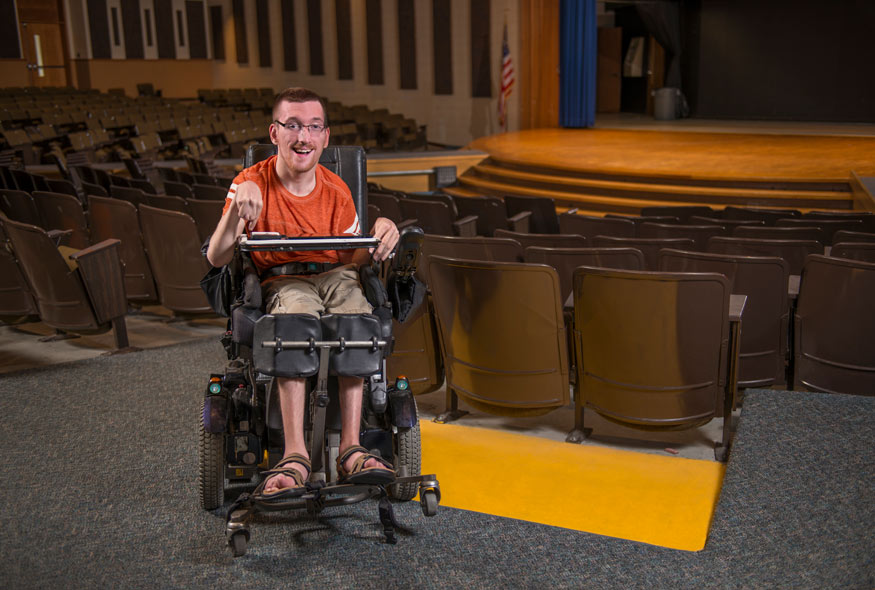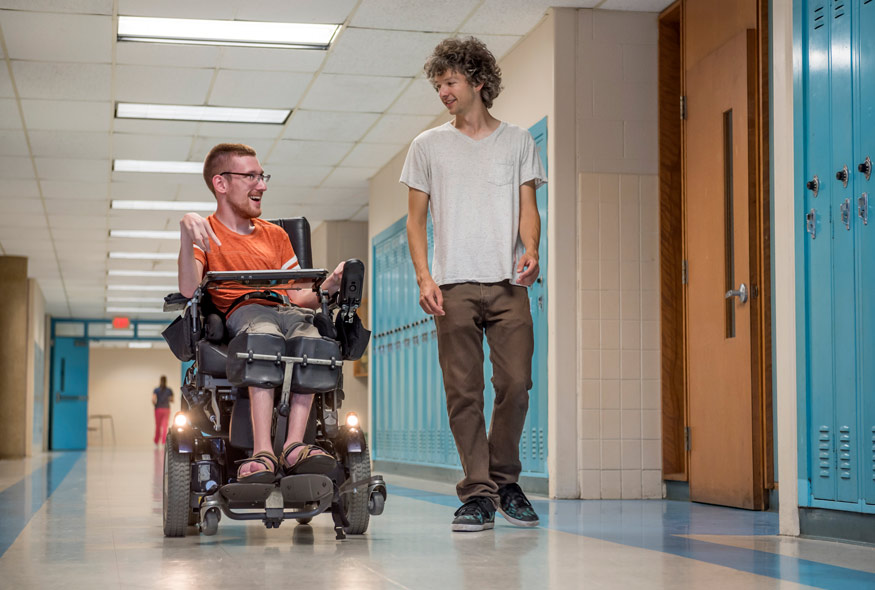
Fighting for Access
When RHD Rhode Island won entry into an art exhibit at Pawtucket City Hall commemorating the Americans with Disabilities Act, everyone lent a hand in helping get the artists’ work on the walls. Stephen, a client at RHD Rhode Island, went to city hall to supervise the setup. He wanted to make sure the installation, that of all things celebrated the ADA, was accessible. Stephen has cerebral palsy, and he knows the challenges people in wheelchairs face.
He found that the building was very accessible, beginning with a lift he could use to navigate the stairs. But Stephen found that he needed somebody to open the door of the lift once he reached the second floor. The janitor happened to be there that day, but he wasn’t sure what might have happened if he’d dropped by unannounced, or if there had been no one there to help.
So he made a note, and took a few photographs, and the Pawtucket City Hall became the next project for Equal Access RI — a personal experiment Stephen began in order to track the accessibility of public buildings in Rhode Island. With the support of the staff at RHD Rhode Island, Stephen’s project has developed partnerships with other human service agencies and accomplished changes at a number of buildings, including schools in the Johnston School District.

In August Stephen was honored for his efforts with the Blackstone Valley Creative Advocate in Disability Award, presented annually to an individual with a disability who is “dedicated to positively affecting the lives of individuals with disabilities, creatively helping expand the full inclusion of all people in our communities.” In addition, Stephen is in discussions with the Pawtucket School Committee about turning his advocacy efforts into a paying job as an independent contractor.
“When I’d have to eat lunch by myself in a classroom because there wasn’t a lift for the cafeteria, or when I’d miss out on gym class because I couldn’t access the gym, I felt excluded, like I wasn’t a ‘regular’ student, like I didn’t fit in or belong,” said Stephen, who regularly blogs on his experiences on the Equal Access RI website. “I want to make sure that other people don’t have to experience the same struggles that I did.”
RHD Rhode Island is a day program that serves individuals with developmental disabilities. The creative, intellectually stimulating, art-based day program provides family support services, community job development and supported employment. While most people in the community know it as an art studio, RHD Rhode Island’s person-centered services engage clients no matter where their interests lie.
“At RHD Rhode Island, our program isn’t just one thing — and we’re proud of that,” Director Mike Wilson said. “We don’t say no, we say: OK, what could that look like? Let’s look at what you’re interested in, and see how that could work. You have an idea, and that has value, and we respect that by pursuing it with you. We respect and honor what your interests are.
“When you’re surrounded by creative people, they problem solve in a creative manner. It happens here all the time; the free flow of creativity certainly lends itself to the art, but it shows up in how we problem solve in general.”
When Stephen began day services at RHD Rhode Island, he’d already convinced Rhode Island Commissioner of Education Deborah Gist to meet with him to discuss his experiences with access at Johnston Public Schools. The staff jumped in to help Stephen turn his passion for advocacy into a formal presentation.
“We had six weeks to prepare,” Stephen said. “The wonderful people at RHD-RI were there to support me, to lend a hand, and most importantly to push me to do more myself, instead of simply doing things for me.
“The staff helped me take my old Johnston presentation and completely reorganize and simplify it, making it more effective and appropriate for our new audience. Even more impressive, with their help, I was able to create a basic business plan, design a logo, print business cards, take professional photos, and develop an entire website in time for the meeting. My staff encouraged me to be confident in my own voice and to lead the presentation myself, even though I was really nervous about it, and they helped me practice it ahead of time.”
When Stephen gave his presentation, the RHD Rhode Island staff showed up to support him.
“You know what I’m proudest of?” Wilson said. “After Stephen gave his presentation, the superintendent turned to me and said: And why are you here? I loved that. To me, that’s success. It’s about Stephen and who he is. The focus is on him. We’re there to support him, but not do it for him, not overshadow who he is and what his idea is.
“I think we helped him kind of negotiate this process. And I think he learned a lot from what we were able to do with him. But we learned a lot from him, too.”
Stephen’s efforts have been very successful; he convinced his high school to pull out seats in the auditorium and add a handicap seating section, Graniteville Elementary School installed new intercom system by the handicap ramp, and the Johnston Town Hall agreed to install a ramp for wheelchair access.
Stephen continues to do assessments at public buildings and make recommendations to local officials. His preferred method is to show up unannounced and try to access the building as he would on any normal day, and just see how he does.
“He’s into the adventure of it,” said RHD Rhode Island Direct Service Professional Brian Mustari, who assists Stephen in taking notes and photographs, and helps work on the website.
Stephen’s efforts are based on the simple notion that a building can be within the letter of the law as far accessibility and meet the existing federal standards — but still present challenges that could limit access to people.
“I think, because of my perspective, I can make a difference,” Stephen said. “We all deserve the freedom to access the places we want to go. I’m glad I’ve had the support to be able to pursue it.”



